Professor Delvaux
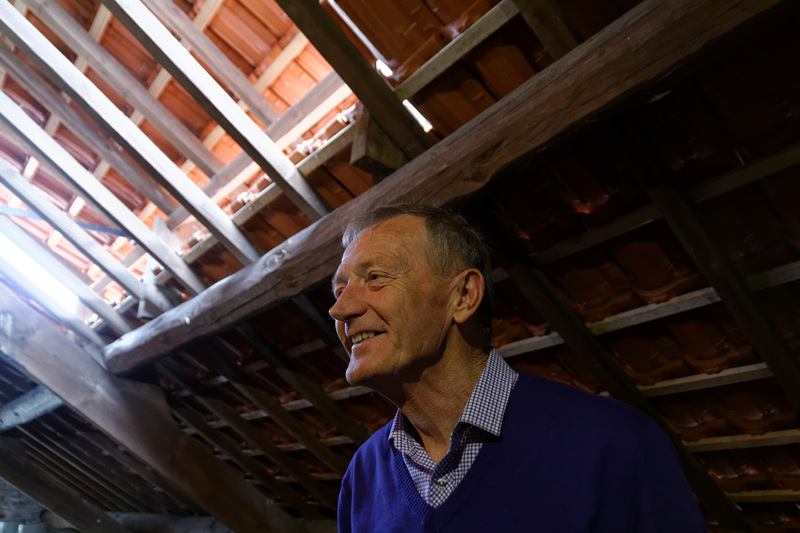
Professor Delvaux |
Arriving at the de Kroon Brewery we're met by a smiling, kindly man in his forties. This, it turns out, is not the brewer. "The professor will be with you in five minutes," he says. The professor? Anyway, the brewer is finishing up an earlier tour group, but will be with us shortly. We potter around, take a few pictures, while some of us split a beer at the bar. (This is part 4 of the Scandinavian beer bloggers' tour.)
Then a slim, dapper man in his late sixties turns up, with unruly white hair and shining, kindly blue eyes. He takes us on a tour of the historic brewery de Kroon and his new brewery with the same name, but we quickly realize that actually, the brewer himself is the main attraction. His name is Freddy Delvaux, and for some reason he's almost unknown outside Belgium.
From what he says during the tour, and little bits and pieces I've found online, I've managed to put together a kind of outline of his career. He finished a PhD in microbiology in 1972, then started as head of lab at the Artois Brewery the next year. The brewery was already then one of the biggest in the world, so becoming head of lab there just after finishing a PhD is quite a feat. Delvaux is famous today as "the best nose in Belgium," which may well have had something to do with it.
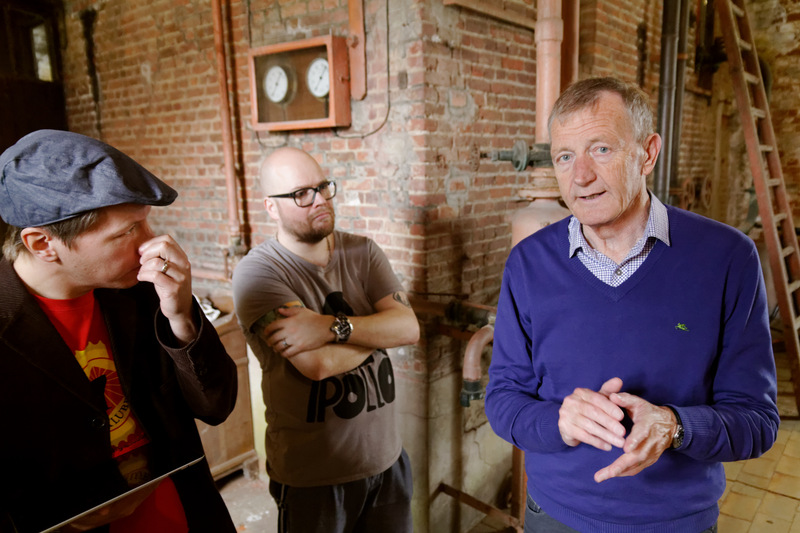
Freddy speaking |
A decade and half go by. Then, in 1988 the Artois Brewery merged with Piedboeuf (the makers of Jupiler) to form Interbrew (later to become AB Inbev). A couple of years later, Delvaux left the brewery, taking up the position of professor of brewing at the university in Leuven. His first task there was to establish a Malting and Brewing Laboratory, which he ran for the next couple of decades.
In this period he must have done external projects, too, because he developed the recipe of Tripel Karmeliet for the Bosteels brewery. Tripel Karmeliet is by now a Belgian classic, and one of my favourites, a very clean and strongly flavoured tripel with coriander and banana notes. I'm not the only one to like it, since it's very highly rated on Ratebeer. So that's another pretty impressive achievement.
At one point Delvaux told the owners of the Bockor brewery that "you need to make a good beer, too." The owners didn't reply to this at the time, but came back two years later, saying "you want us to brew a good beer? OK, you make it, then." That was the complete specification of the beer, says Delvaux, laughing. So he developed the recipe for Omer Blond for them. I was a bit surprised by this, because I remembered it as a really boring beer. I tried it again after coming home, and was really impressed. It's fruity, fresh, intensely clean, and very vivid. It's actually an excellent beer. Ratebeer again agrees.
Eventually, however, Delvaux hit the age of 65, the mandatory retirement age in Belgium. He was able to stave off retirement for a few years, since it was difficult to find someone to replace him, but eventually he had no choice. So, what to do? Start a new brewery, of course! The next blog post will cover that brewery, but in the meantime there turns out to be more to the story.
When I asked him why he would choose to start a brewery after retiring Delvaux smiled and said his son had wanted to run his own business, so that was why. It turns out to be very much a family affair, because not only is one son running the company (he's the man who met us), but the other son, Filip, also has a PhD in brewing and is part of the company.
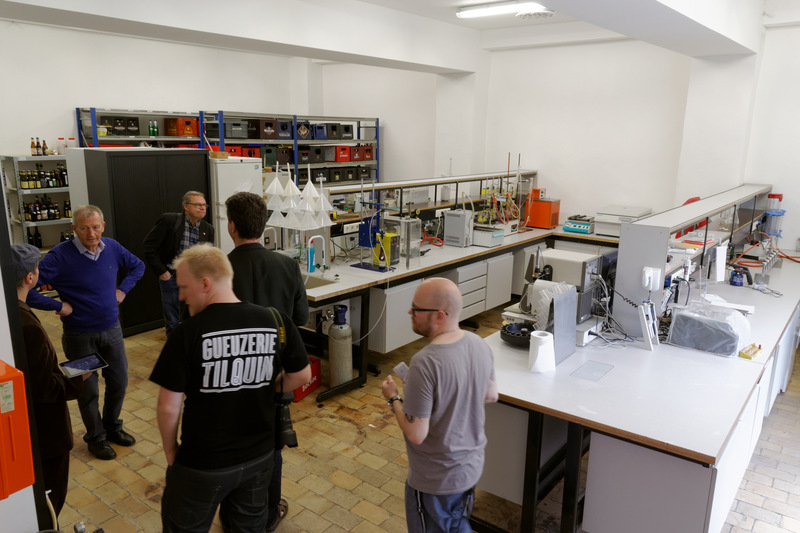
In the lab |
I say "company" rather than "brewery", because the Delvauxes have also started what they call the Delvaux Beer Centre, which is essentially a consulting company catering to other breweries. They do quality monitoring, give advice on improvements, and also develop recipes for their customers. I'd never heard of breweries getting outside specialists to advise them on brewing before, but when those specialists are the Delvauxes I suppose that does make sense.
Delvaux took us on a tour of his lab, which was full of high-tech equipment for analysing CO2, head retention, spectroscopy (to see what substances are present in the air in the top of a bottle), yeast gene analysis (gel electrophoresis), etc etc. "We don't do DNA analysis ourselves," said Delvaux, "because nowadays there are good labs that can do it for you." One shelf in a corner held beer bottles, organized by a system I'd never seen before. The bottles were sorted by problem, noted on little paper labels saying "CO2", "microbiology", "carbonation", and so on. The bottles are samples from customers asking for advice on these aspects of the beers.
And the customers? Bosteels, Westmalle, Grimbergen, Het Anker, Haacht, Affligem, Alken Maes, Jupiler, Palm, St. Bernardus, Rodenbach, Achouffe, Halve Maan, Duvel/Moortgat, and many more. Skrubbe has the full list. So mostly fairly major breweries that you'd think would have their own labs (actually, many of them probably do), and some of them brewers of very good beer. But they are not above getting a helping hand from the Delvauxes, it seems.
They also have a yeast bank with more than 300 yeast strains kept here and in another location. Asked what the other location might be Delvaux laughs: "at home." "Is it as backup," I ask. "Yes, yes, as backup," Delvaux agrees.
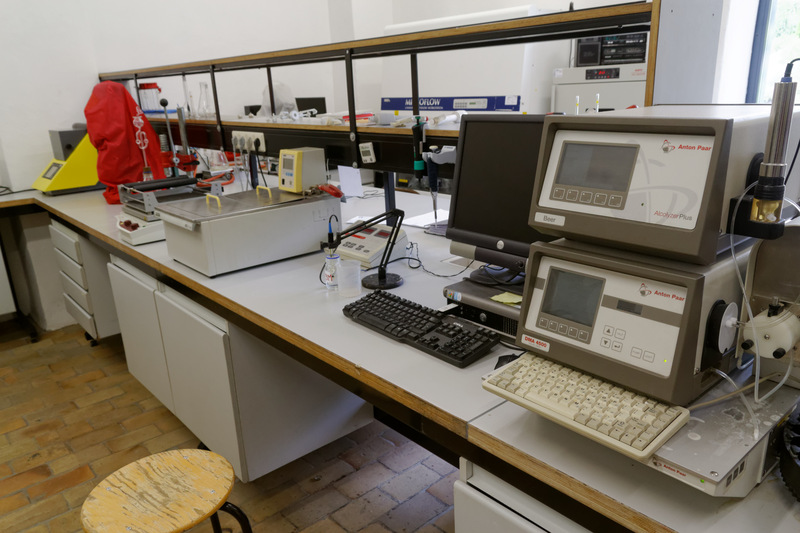
More lab equipment |
Realizing that here was at last an expert I could ask about the mystery of Lithuanian yeast I buttonholed Delvaux during a short break. I explained about the family yeast, its unusual properties, and the GenBank findings. Could it really be a new species, I asked? Delvaux seemed to at once understand why I was so excited, but shook his head sympathetically. "Well, you see, that's a major project to find out." He paused, then added, almost to himself, "yes, yes, it could be, it could be, but ... it takes a lot of work." Seeing my disappointment he smiled encouragingly, but there wasn't much more to be said.
After the tour we sat down for lunch in the de Kroon cafe, and Delvaux ate with us, giving us a chance to ask a few more questions. He'd said that after brewing lager for 17 years at Artois he wasn't going to brew lager in his own brewery, implying that he wasn't all that pleased with the product. This inspired me to ask him if it was true that Stella Artois had changed over the last decade. "Oh, certainly," he said. "When I started brewing it in 1973 it was 33 IBU, but today it's only 20. If you lower the bitterness half a unit per year, nobody will notice." So it was true. If anybody would know, it would be Freddy Delvaux.
After the lunch, we got ready to leave, but we're not quite finished with de Kroon yet, because I've only given you half the story. The next blog post will cover the brewery itself, both the historic one and the new one. Anyway, I have to say I came away from de Kroon deeply impressed by Freddy Delvaux, and I wasn't the only one.
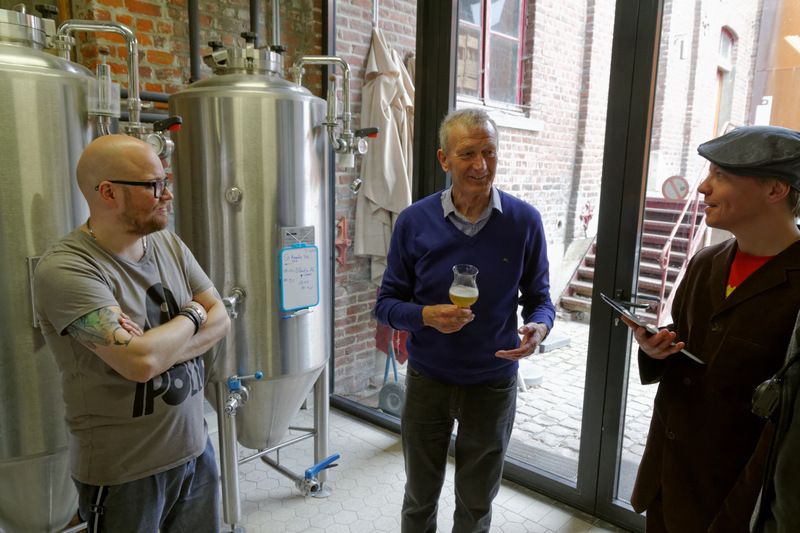
In the new brewery |
Similar posts
Brouwerij de Kroon
When the Delvauxes decided to start their own brewery they purchased the historic de Kroon brewery in Neerijse, just outside of Leuven
Read | 2014-06-03 18:50
Alstadberger
Driving hurriedly on from Storli Gard, we arrived at the island of Tautra outside Trondheim late at night
Read | 2014-09-03 19:59
Comments
No comments.